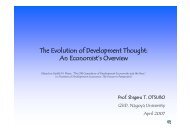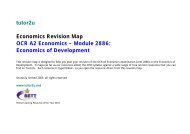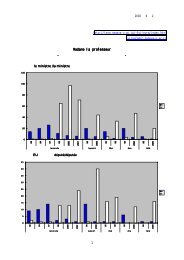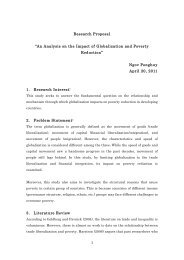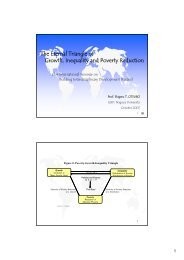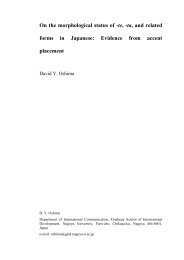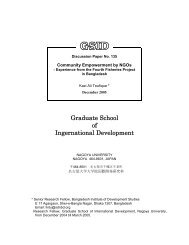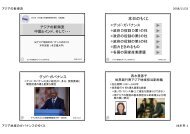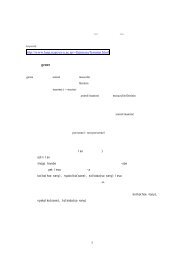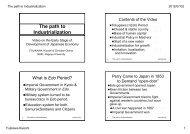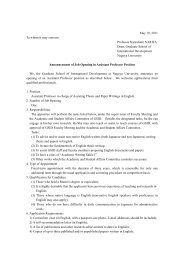Report
Report
Report
You also want an ePaper? Increase the reach of your titles
YUMPU automatically turns print PDFs into web optimized ePapers that Google loves.
152 QUANTIFICATION OF BENEFITS FROM ECONOMIC COOPERATION IN SOUTH ASIA<br />
commitments have also been undertaken with regard<br />
to temporary movement of medical professionals<br />
engaged in medical or dental services. Commitments<br />
have however been undertaken in respect of ‘specialists’<br />
who are employed in a juridical person having<br />
commercial presence in India.<br />
As will be seen in the discussions later in this chapter,<br />
the domestic regulatory framework in India allows for<br />
100% FDI for hospitals. The regulatory framework<br />
also allows for limited entry of foreign qualified doctors<br />
and dentists.<br />
The Maldives 9<br />
Maldives has not undertaken any commitments on<br />
Health and Medical services under the GATS as yet.<br />
However, as will be discussed later in this chapter, the<br />
domestic regulatory regime in fact allows for foreign<br />
participation in the delivery of health services, and also<br />
allows for limited entry of foreign qualified doctors<br />
and dentists.<br />
Nepal 10<br />
Nepal’s schedule of commitments under GATS specifies<br />
that with regard to Hospital services it has no restrictions<br />
with regard to delivery of services under Modes<br />
1 and 2.<br />
Mode 3: With regard to Mode 3, it mandates<br />
incorporation in Nepal and allows for maximum<br />
foreign equity capital of 51%.<br />
Mode 4: Under Mode 4, the schedule specifies that<br />
foreign medical experts can work in Nepal with the<br />
permission of the Nepal medical council for a maximum<br />
duration of one year. Additionally, the horizontal<br />
section states that ‘specialists’ employed in a juridical<br />
person having commercial presence, will be given access<br />
for an initial period of 3 years, which may be extended<br />
to 7 and a maximum of 10 years. Other categories of<br />
natural persons who will be provided entry are ‘service<br />
salespersons’ and persons responsible for setting up<br />
commercial presence.<br />
As discussed later in this chapter, the regulatory<br />
framework allows for 100% FDI for hospitals in Nepal.<br />
Pakistan 11<br />
With regard to both Hospital and Medical and Dental<br />
Services, Pakistan’s GATS schedule specifies as follows:<br />
Mode 1: Mode 1 is unbound because of what Pakistan<br />
perceives is “lack of technical feasibility” in crossborder<br />
supply of such services.<br />
Mode 2: There are no restrictions on Mode 2.<br />
Mode 3: Under Mode 3, incorporation is necessary and<br />
foreign participation up to 51% is allowed. Mode 3 is<br />
further subject to Pakistan Medical and Dental Council<br />
regulations.<br />
Mode 4: No commitments have been undertaken with<br />
regard to Mode 4 for the Health sector. The horizontal<br />
section states that specialists who are employed by a<br />
juridical person having commercial presence, will be<br />
provided access. The quota for such specialists is 50%<br />
of the requirement of the juridical person. The time<br />
period for the access however is not specified.<br />
As discussed in the subsequent section, the<br />
framework for FDI in Pakistan allows for 100% FDI<br />
for hospitals. Movement of foreign doctors also seems<br />
to be possible under the regulations.<br />
Sri Lanka 12<br />
Sri Lanka has not undertaken any specific commitments<br />
under the Health or Medical/ Dental services subheadings.<br />
However, from its horizontal commitments,<br />
the following commitments can be inferred:<br />
Mode 3: Foreign investment of up to 40% of equity in<br />
a company proposing to carry on Medical and Dental<br />
services is allowed under the automatic route. Any<br />
investments above this limit require approval from the<br />
relevant investment authority in Sri Lanka.<br />
Mode 4: The horizontal section of the schedule specifies<br />
that movement of natural persons is subject to Sri<br />
Lankan laws on immigration, consumer laws, and other<br />
relevant laws and regulations, and that aliens seeking<br />
to work will need to acquire a work permit. Categories<br />
9<br />
See, GATS/SC/101, 30 August 1995, available at www.wto.org<br />
10<br />
See, GATS/SC/139, 30 August 2004, available at www.wto.org<br />
11<br />
See, GATS/SC/67, 15 April 1994, available at www.wto.org<br />
12<br />
See, GATS/SC/79, 15 April 1994, available at www.wto.org




